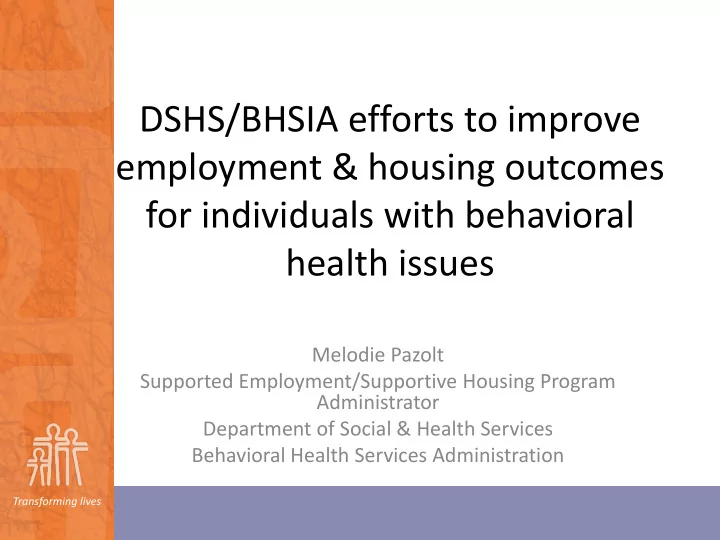

DSHS/BHSIA efforts to improve employment & housing outcomes for individuals with behavioral health issues Melodie Pazolt Supported Employment/Supportive Housing Program Administrator Department of Social & Health Services Behavioral Health Services Administration Transforming lives
Presentation and Panelist Overview • Overview of DSHS/BHSIA efforts to improve employment & housing outcomes for individuals with behavioral health issues • Melodie Pazolt, Department of Social and Health Services • Voices from the Field in Washington • Kate Baber, Washington Low Income Housing Alliance • Nicole Macri, Downtown Emergency Service Center • National efforts on financing and implementing supportive housing • Carol Wilkins • National efforts on financing and implementing supported employment and Washington Pilots • Sandy Reese, Dartmouth Psychiatric Research Center Transforming lives Washington State Department of Social & Health Services
Building on Opportunities • Legislative direction to improve client outcomes including employment and housing status – SB5732- HB1519 • National attention and assistance from Policy Academies – Supportive Housing White Paper – Supported Employment strategic planning • Recognized as potential promising interventions within the Healthier Washington Initiative (SHCIP/CMMI SIM grant) • Supportive Housing and Supported Employment Medicaid coverage authorized in SB 6312 Transforming lives Washington State Department of Social & Health Services
The Intersection between Housing & Employment SAMHSA’s goal is a high -quality, self-directed, satisfying life integrated in a community for all people in America. This includes: A Healthy Life A Home A Purpose A Community Transforming lives Washington State Department of Social & Health Services
Why improve Employment outcomes? • Legislative direction to improve client outcomes – SB5732- HB1519 • 2/3 of people with serious mental illness want to work • Supported Employment (IPS) is a research based practice (SAMHSA has identified it as an EBP) • Employment services can save the state money – fewer health care services • Olmstead Decision mandates services must enable individuals to fully integrate into the community Transforming lives
Unemployment is unhealthy! Side Effects of Unemployment in the General Population • Increased substance abuse • Increased physical problems • Increased psychiatric disorders • Reduced self-esteem • Loss of social contacts • Alienation and apathy (Warr, 1987) Transforming lives 6
Employment Rate through UI data for adults in outpatient mental health services WA State Individuals 2013:Q1 2013:Q2 2013:Q3 2013:Q4 2014:Q1 50,387 50,834 48,812 47,962 51,165 Total with SSNs Employed 4,514 5,183 5,184 4,960 5,142 Clients 9% 10% 11% 10% 10% % Emp WAGES $754 $764 $766 $782 $788 Monthly Wages $12.10 $11.97 $11.80 $12.15 $11.99 Wage Rate HOURS 14 15 15 15 15 Weekly Hours Transforming lives Washington State Department of Social & Health Services
Changing Our Belief System: One Turn of the Kaleidoscope • From : Work is too • To : Work helps with recovery! People stressful. People can only hope for “maintenance” can and do work! and “stabilization.” “Recovery -oriented practice . . . reverses the conventional wisdom . . . that people become less symptomatic first before trying to return to work . . . work reduces symptoms while sustained unemployment and inactivity do not .” (Davidson, 2010) Transforming lives 11
Opportunities in WA State • SAMHSA sponsored Olmstead Policy Academy – Strategic planning to increase empoyment outcomes: • Increasing the knowledge/skills of the behavioral health workforce • Pursue financing for Supported Employment • Educate the community – individuals, families, business • Submitted Ticket to Work Employment Network application to generate new revenue • 2SSB 6312 – Behavioral Health Integration – BHO’s may provide Supported Employment Transforming lives
Opportunities in WA State • Participation in DOL/ODEP Employment First Initiative – Technical Assistance to develop a multi- system strategic plan (DDA, HCS, DVR) • Coordination with the Governor’s Task Force on Employment for people w/Disabilities • SAMHSA Grant – Becoming Employed Starts Today (BEST) awarded 9/14 – 2 communities will implement SE Transforming lives
DSHS/BHSIA efforts to address homelessness • Active in seeking grant funding to increase efforts (PORCH, BRIDGES etc.) • Core elements that are common through all of our grant funded efforts – Partnership with Housing Systems (HUD/Dept. of Commerce) – Utilize individuals with lived experience to engage individuals who are homeless – Address the whole health needs of the individual while addressing Maslow’s hierarchy of needs Transforming lives Washington State Department of Social & Health Services
DSHS/BHSIA efforts to address homelessness • Chronic Homeless Policy Academy • Permanent Options for Recovery Centered Housing (PORCH) – served 200 • Projects for Assistance in Transition from Homelessness (PATH) – served 5136 through outreach efforts • Offender Re-Entry Community Support Program (ORCSP) • Oxford – 239 Houses Transforming lives Washington State Department of Social & Health Services
DSHS/BHSIA’s New Opportunities • Bringing Recovery Into Diverse Groups through Engagement and Support (BRIDGES) – outreach to 600 individuals • BRIDGES Supplemental Grant – outreach to 200 individuals • Housing & Recovery through Peer Services (HARPS) – 1000 to receive subsidies – 200 to receive services Transforming lives Washington State Department of Social & Health Services
Permanent Options for Recovery- Centered Housing (PORCH) • 2 sites within WA state (Pierce County & Chelan/Douglas Counties) • Utilize Peer Support to provide Evidence-Based Permanent Supportive Housing • Utilize Illness Management & Recovery to measure recovery • Partnerships with Housing System (Dept. of Commerce provided $300,000 in TBRA in C/D Counties) Transforming lives Washington State Department of Social & Health Services
Oxford Houses Transforming lives Washington State Department of Social & Health Services
Photovoice Presentation Transforming lives Washington State Department of Social & Health Services
Recommend
More recommend